Translate this page into:
ATTITUDE TOWARDS COVID-19 IN DENTAL COLLEGE POPULATION: A CROSS SECTIONAL STUDY.
Corresponding Author : Dr. Aparajita Tiwari
This article was originally published by Indira Gandhi Institute of Medical Science and was migrated to Scientific Scholar after the change of Publisher.
Abstract
Introduction:
In this COVID -19 pandemic dentists are at high risk of cross-infection. The dental practice is a source of cross contamination in the absence of adequate preventive measures. As COVID -19 is highly contagious and use of air rotors adds to air born route for transmission and dentist's proximity to the oropharyngeal area of the patient, a dental professional is always at higher risk. Therefore all the dental students and professionals should be competent with knowledge and must be aware of precautionary methods, social distancing, sanitization and vaccination.
Aim:
The present study is aimed to assess the attitude towards COVID-19 in dental college population
Materials & Methods:
This study was conducted among 200 participants, the faculties and students in a dental college. A ten questions multiple choice questionnaire form was prepared on effect of COVID-19 on participant's life and distributed among the participants who were divided into two groups as faculty & students, in the dental college and their response was tabulated and analyzed.
Results:
The results of this study suggested that majority of participants of both the groups strictly followed precautionary measures, followed social distancing, taken both the doses of vaccination and showed positive attitude towards prevention of further spread of corona virus.
Conclusion:
The participants in this study seemed to be aware of the detrimental effects of COVID-19 and had good knowledge, attitude and selfcare practice, which are necessary in preventing the spread of COVID-19.
Keywords
COVID-19
precautionary measures
Attitude
Detrimental effects.
INTRODUCTION:
Corona virus disease is an infectious disease. It is caused by single-stranded RNA viruses.1 Severe Acute Respiratory Syndrome Corona virus-2 (SARS-CoV-2) is the name officially given to Corona virus by WHO. because the virus is thought to be genetically related to the coronavirus. It was also responsible for the SARS outbreak of 2003.2 This virus is reported to cause multiple respiratory diseases, such as common cold, pneumonia, organ failure, and even death.3 It's transmission occurs through infectious respiratory tract secretions through direct and indirect routes. Direct transmission occurs through a coughing, sneezing, or droplet inhalation, while indirect transmission occurs through oral, nasal, eye or mucous membrane contact.4 In this COVID -19 pandemic dentists are at high risk of cross-infection due to dental procedures. The first COVID-19 positive dentist was reported in China where the infection is said to be originated from, and eventually other health professionals were tested COVID positive.5 The dental practice is a potential source of cross contamination in absence of adequate preventive measures.6 Use of air rotors adds to air born route for transmission and as dentist deals with the oropharyngeal area of the patient a he or she is always at higher risk of infection. Therefore, all the dental students and professionals should be competent with knowledge of transmission of COVID-19 and must be aware of precautionary methods, social distancing, sanitization and vaccination.7 An offline multiple choice questionnaire survey was conducted in a dental college among the faculties and students to know their awareness and attitude towards COVID-19.
MATERIALS AND METHODS:
This cross-sectional study was conducted among 200 participants, the faculties and students of dental college from december 30th till 4th of January 2022, just before the lockdown in the state of Bihar. Ethical clearance was taken from the institution Ethical committee, Buddha Institute of Dental Sciences under Ref. No.245/BIDSH/1-Dec-2021. A written informed consent was taken from each participant in the study. This study followed the ethical standards of the Helsinki Declaration of 1975, as revised in 2008. The designed study was offline. It was preferred for its convenience. All the faculties and the interns of the dental college were included in this study. The sample size of 200 participants was taken using the formula, N= 2 [{P*(1-p)2*(Z)2}/(ME)2], where P = percentage of study sample, Z= confidence interval, ME= margin of error.
A ten questions multiple choice questionnaire form was prepared and distributed among the participants in the dental college. The questions are based on extent of Effect of COVID -19 on the participant's life, following precautionary measures, following social distancing, following Fumigation and sanitization, and about participant's vaccination status. Participants are asked to mark only one response out of the three choices for each question. All the filled questionnaire forms are collected and the data are tabulated in a table and analyzed.
Stastical analysis:
All the tabulated data were analyzed using SPSS software version 23 and chi square test is used. Output measures were presented as frequency and percentage.
RESULTS:
A total of 200 participants participated in the study . No response in the filled questionnaire form was excluded or found having missing information. There were 65(32.5%) Faculties and 135(67%) student participants in the study, out of them 45 were males and 155 were females.[Table 1]. Percentage was shown in. [Figure 1]. Suggested 24.4% male faculties and 75.6% male students participated and 34.8 % female faculties and 65.2% female students participated in the study.
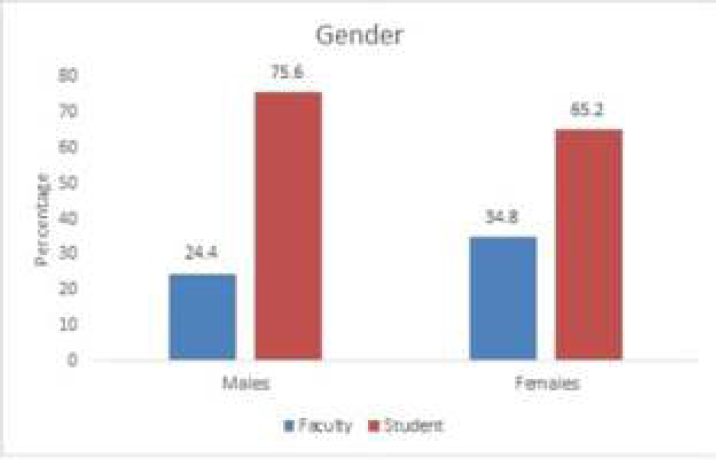
- Percentage of male and female participants in the study.
| Participants | Males | Females | Total |
|---|---|---|---|
| Faculty | 11 (24.4%) | 54 (34.8%) | 65 (32.5%) |
| Student | 34 (75.6%) | 101 (65.2%) | 135 (67.5%) |
| Total | 45 (100%) | 155 (100%) | 200 (100%) |
About the extent of effect of COVID-19 on the study group, 40 Faculties responded, due to COVID-19 they were effected to large extent, 23 to some extent and 2 not at all. Among Students 90 responded that they were effected to large extent, 35 to some extent and 10 were not effected at all. Chi square value is 2.932. The P value is 0.204. No statistical difference present between the study groups. [Table 2] Percentage of effect of COVID-19 in study group. [Figure 2]. Demonstrated clearly the extent of COVID effect participants experienced in both the groups.
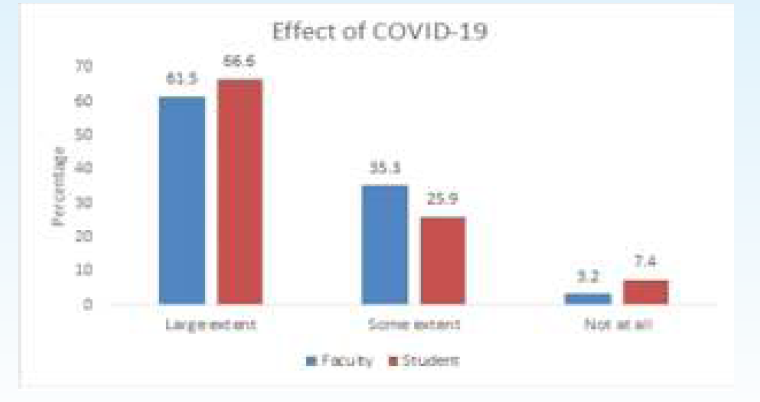
- Showing percentage of effect of COVID-19 in study groups.
| Effect of COVID - 19 | Faculty | Student | Chi square | P value |
|---|---|---|---|---|
| Large extent | 40 (61.5%) | 90 (66.6%) | 2.932 | 0.204 |
| Some extent | 23 (35.3%) | 35 (25.9%) | ||
| Not at all | 2 (3.2%) | 10 (7.4%) |
Regarding following precautionary measures in Faculty group 57 participants responded that they were strictly following all the precautionary measures. 7 followed it sometimes and 1 participant followed not at all. In the student group 127 followed strictly, 7 followed sometimes and 1 followed not at all. Chi square value is 2.427. The P value is 0.297. No statistical difference present between groups. [Table 3]. Percentage of precautionary measures followed by the participants. [Figure 3] Suggested majority of the participants of both the groups followed it strictly. Participants following social distancing, among Faculties 28 were strictly following it 36 to some extent and 1 not at all. Among Students 80 followed strictly, 52 to some extent and 2 not at all. Chi square value is 4.949. The P value is 0.084. No significant difference noted between the study groups. [Table 4]. Percentage showed 43% faculties an 59.2% students followed social distancing strictly, 55.3% faculties and 38.5% students followed it to some extent and 1.7% faculties and 2.3% students did not follow social distancing at all. [Figure 4].
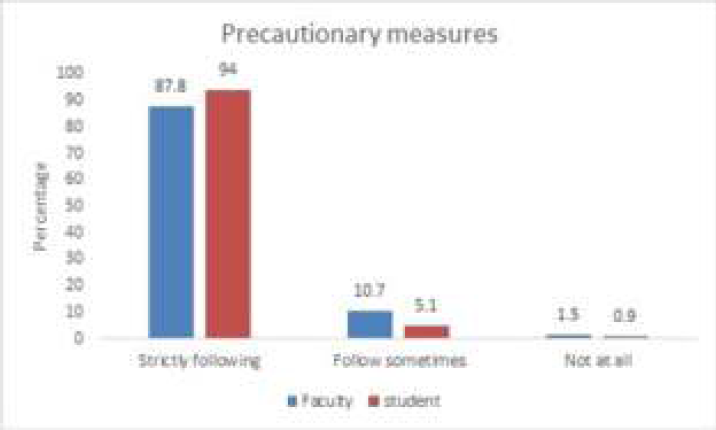
- Precautionary measures followed by the participants.
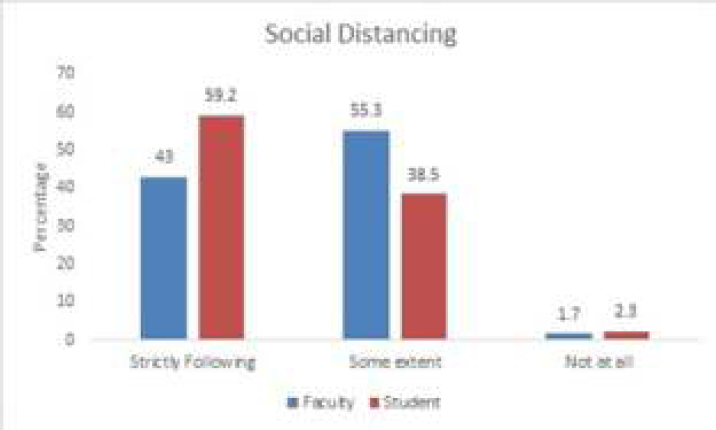
- Social distancing followed by participants.
| Precautionary measures | Faculty | Student | Chi square | P value |
|---|---|---|---|---|
| Strictly following | 57 (87.8%) | 127 (94.0%) | 2.427 | 0.297 |
| Follow sometimes | 7 (10.7%) | 7 (5.1%) | ||
| Not at all | 1 (1.5%) | 1 (0.9%) |
| Social Distancing | Faculty | Student | Chi square | P value |
|---|---|---|---|---|
| Strictly Following | 28 (43.0%) | 80 (59.2%) | 4.949 | 0.084 |
| Some extent | 36 (55.3%) | 52 (38.5%) | ||
| Not at all | 1 (1.7%) | 2 (2.3%) |
Responses for following Fumigation and Sanitization, in Faculty group 63(97%) followed it regularly, 1(1.5%) followed it sometimes and 1(1.5%) not at all. Among students 98(72.5%) followed regularly, 36(26.6%) sometimes and 1(0.9%) not at all. Chi square value is 18.48. The P value is <0.001, which is statistically significant. [Table 5]. Statistical difference was present between the groups taken in the study. Percentage in [Figure 5]. Showed 97% faculties and 72.5% students followed fumigation and sanitization regularly.1.5% faculties and 26.6% of students followed it sometimes.1.5% faculties and 0.9% students followed not at all.
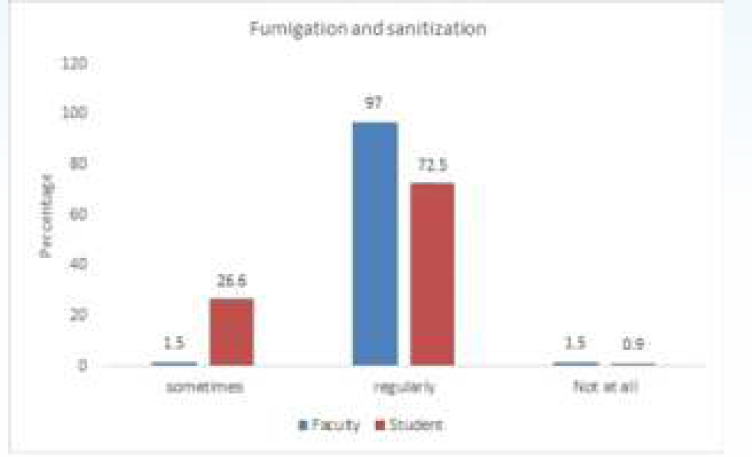
- Fumigation and sanitization followed by participants.
| Fumigation and Sanitization | Faculty | Student | Chi square | P value |
|---|---|---|---|---|
| Sometimes | 1 (1.5%) | 36 (26.6%) | 18.4807 | <0.001 |
| Regularly | 63 (97%) | 98 (72.5%) | ||
| Not at all | 1 (1.5%) | 1 (0.9%) |
Responses for Attitude towards vaccination in the study group in the faculties 36(55.3%) have completed second dose, 28 have taken first dose and 1 participant was not vaccinated. Among students 83 participants have completed the second dose, 51 have taken first dose only and 1 person was not vaccinated at all. Chi square value is 0.8652. The P value is 0.648815 which is non significant. No statistical difference were noted between the groups. [Table 6]. Percentage of vaccination status. [Figure 6]. Showed majority of the participants in both the groups had taken both the doses of vaccination.
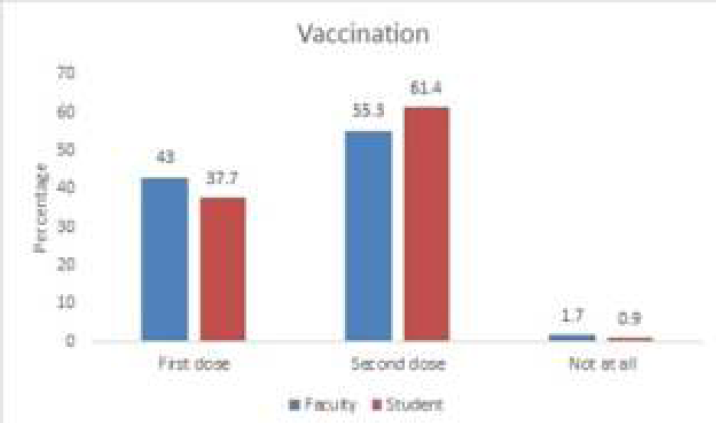
- Attitude towards vaccination in participants.
| Vaccination | Faculty | Student | Chi square | P value |
|---|---|---|---|---|
| First dose | 28 (43%) | 51 (37.7%) | 0.8652 | 0.648815 |
| Second dose | 36 (55.3%) | 83 (61.4%) | ||
| Not at all | 1 (1.7%) | 1 (0.9%) |
DISCUSSION:
The outbreak of COVID-19 pandemic has created a lot of change in lives of dental professionals who are at increased risk to get infected in the line of duty. Therefore awareness regarding the pathogen and ways of preventing infection is very much required in safeguarding self while managing asymptomatic people.8 Dentistry is an important stream of healthcare and although Dentists are not in the forefront of COVID care, dental professionals have a very important role in society. Knowledge, attitudes, preventive practices are very important, as they help in adopting and practicing safety guidelines for the betterment of the professional as well as to the patient they are attending to.9
The results of this study suggested that majority of participants of both the groups strictly followed precautionary measures, followed social distancing, taken both the doses of vaccination and showed positive attitude towards prevention of further spread of corona virus. This was in accordance with the literature of previous study conducted by Hsin Chung Cheng et al, Shanthi Vanka et al.6,2 who investigated the impact of COVID-19 on the knowledge, attitude and behaviors of infection control among dentists and found that the use of PPE, hair caps, and protective eye mask or face shields was also greatly improved during the COVID-19 pandemic. The same results were also found regarding the practice of table surface disinfection and keeping the treatment table clear when not in use. This finding is consistent with our study as there were greater number of participants following fumigation, and social distancing. Ruba M. Mustafa et al, Almulhim Basim et al.7,4 conducted a study on Dentist's Knowledge, Attitudes, and Awareness of Infection Control Measures during COVID-19 Outbreak and found that the prevention measures ranging from social distancing and hand washing to protective equipment, including surgical masks, face shields, gowns, and gloves are important protection measures for dental professionals. This finding is consistent with our study. A Study conducted by Boukhobza et al8 on the covid-19 pandemic and its impact on knowledge, perception and attitudes on dental students provided an overview of the student's perceptions of the novel virus and attitudes to infection control because lack of knowledge or faulty attitudes can put the dental staff and the patients safety and health at risk and might affect the functioning of the health care system. This study finds good general knowledge on COVID-19 among dental students which is consistent with our study . Nawaf Labban et al.9 in his study concluded that dental providers globally require a constructive attitude towards infection control measures in order to begin addressing the complex issues of how they would explain to patients and other staffs about what treatments were allowable and what new protocols were needed to enhance everyone's safety in relation to the severity of the disease, according to this study dental professionals have positive attitude and good knowledge about transmission-based precautions. This result is consistent with our study as most of our participants showed positive attitude towards following transmission based precautionary measures.
The present study clearly indicates that the knowledge on viral pathogenesis and safety practices was high in the participants irrespective of whether they were students or faculties. The results suggested that all the participants being healthcare professionals were aware that coronavirus outbreak is going to continue for a long time and virus cannot be completely eradicated and that will continue to exist in society.4 Participants showed positive attitude towards taking all the precautionary measures and getting all the dosage of vaccination and they are not afraid of this pandemic and they have accepted this as a new normal.10
CONCLUSION:
The participants of the present study seemed to be aware of harmful effects of COVID-19. They showed positive precautionary approach towards it. The results of the study indicate that the participants had good knowledge, attitude and self-care practice, which are necessary in preventing the spread of COVID-19.
Limitations:
Small sample size was taken as this study was performed in a dental college. This survey was on a convenience sample and the results may not be generalized to all dentists in this country. Same study could be done on large scale with large sample size among different dental colleges across the country. Parameters such as age, marital status were not assessed in this survey. In further studies different parameters could be taken under consideration.
Future prospects:
To study on large sample size about COVID-19 on lifestyle and attitude for a better world for everyone.
REFERENCES:
- Awareness and attitude toward COVID-19 among the students of a rural tertiary care center and dental college: A cross-sectional study. Int J Prev Clin Dent Res. 2020;7:99-103.
- [CrossRef] [Google Scholar]
- Knowledge, Attitude and Practices on COVID-19 among Patients Attending a Private Dental College in Jeddah. J Clin Diag Res. 2020;14:43-46.
- [CrossRef] [Google Scholar]
- Novel corona virus (Covid- 19) knowledge, attitude and practice amongst dental postgraduate students to prevent the spread of infection - A cross sectional pan India survey study. J Evolution Med Dent Sci. 2021;10:2176-2180.
- [CrossRef] [Google Scholar]
- Dentistry Amidst the COVID-19 Pandemic- Knowledge, Attitude, and Practices Among. the Saudi Arabian Dental Students Front Med. 2021;8:654524.
- [CrossRef] [PubMed] [Google Scholar]
- A novel corona virus from patients with pneumonia in China, 2019. N Engl J Med. 2020;382:727-33.
- [CrossRef] [PubMed] [Google Scholar]
- The impact of COVID-19 on knowledge, attitude, and infection control behaviors among dentists. BMC Oral Health 2021:584.
- [CrossRef] [PubMed] [Google Scholar]
- Dentists Knowledge, Attitudes, and Awareness of Infection Control Measures during COVID-19 Outbreak. A Cross-Sectional Study in Saudi Arabia. Int J Environ Res Public Health. 2020;17:9016.
- [CrossRef] [PubMed] [Google Scholar]
- The COVID-19 Pandemic and Its Impact on Knowledge, Perception and Attitudes of Dentistry Students in Austria: A Cross-Sectional Survey. J Multidiscip Healthc. 2021;14:1413-1422.
- [CrossRef] [PubMed] [Google Scholar]
- COVID-19 Pandemic Driven Knowledge, Attitude, Clinical Practice, Distress Reactions, and Post-Traumatic Growth of Dental Care Providers in Riyadh City, Saudi Arabia. A Cross-Sectional Study TODENTJ 2021:748-759.
- [CrossRef] [Google Scholar]
- The Knowledge, Awareness, and Attitude Regarding COVID-19 among Trinidad and Tobago Dentists. A Cross-Sectional Survey Oral. 2021;1:250-260.
- [CrossRef] [Google Scholar]







